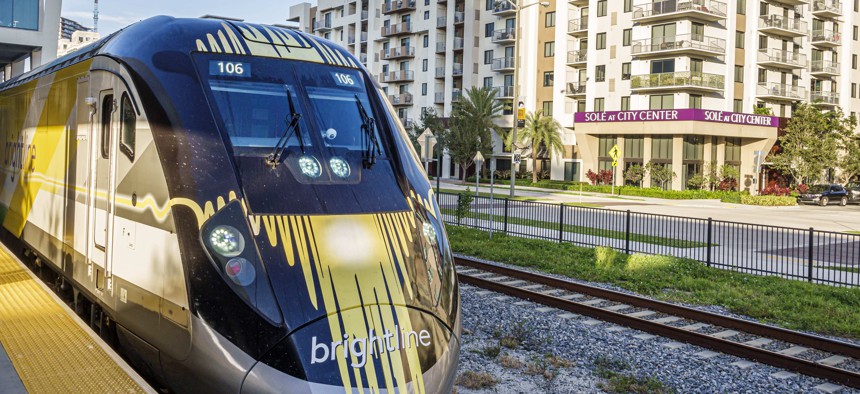Feds Unveil $368M in Grants for Dozens of Rail Projects

Brightline, passenger train engine on platform in West Palm Beach, Florida. Jeffrey Greenberg/UCG/Universal Images Group via Getty Images
The money will go towards upgrades on both freight and passenger lines in 32 states.
The Biden administration will dole out $368 million in grants to improve passenger and freight rail around the country, including nearly $16 million in Florida to support a private effort to add passenger service between Orlando and Tampa.
All told, the rail grants will fund 46 projects in 32 states and the District of Columbia. They come as the Biden administration is trying to prepare the way for major expansions of passenger rail, while also clearing up delivery delays that have made some consumer goods hard to find.
“Americans deserve a world-class rail system that allows people and goods to get where they need to go more quickly and affordably, while reducing traffic and pollution on our roads,” said U.S. Transportation Secretary Pete Buttigieg in a statement Thursday. “We’re proud to award these grants to improve passenger rail for riders and strengthen the freight rail that makes our supply chains and our economy work.”
The Florida grant will help support the expansion of Brightline, a private passenger railroad that currently operates in south Florida, between Miami and West Palm Beach. Brightline is building a connection to the Orlando airport, but it is already working on further connections to the Tampa area along Interstate 4.
The Federal Railroad Administration will pay half the cost for engineering work on the 67-mile route.
“When it comes to this corridor we know that there’s a ridership level that exists there and a potential ridership level that exists there so that makes this project an exciting one for us,” FRA Administrator Amit Bose said, according to the Tampa Bay Times.
The grants were made through the federal Consolidated Rail Infrastructure and Safety Improvements program. About half of the money the Biden administration distributed went to projects in rural areas, twice the minimum required by law.
Railroads, states and local governments submitted $1.1 billion in grant requests for the year, far more than the funding provided by Congress.
FRA designated $87.6 million for projects designed to expand passenger rail. Besides Brightline in Florida, that includes:
- $58 million to help complete engineering work for passenger rail improvements between Richmond, Virginia, and Raleigh, North Carolina. The project “will eventually result in new intercity passenger rail service on a state-owned route that will access currently underserved and minority rural communities with rail service, as well as improve travel times on the existing Amtrak Silver Meteor service,” the FRA said. North Carolina, Virginia and Amtrak are also covering some of the project’s costs.
- $13.9 million to build a new station in Enfield, Connecticut
- $10 million for work to prepare for improvements along a 12-mile stretch in Washington state that could help to ready the segment for high-speed rail and improve commuter rail performance.
- Up to $7.5 million to prepare for grade separations in San Jose, California, that could also help roll out high-speed rail in the area.
Buttigieg touted the funding while on a visit to Michigan, where, among other things, he met with Gov. Gretchen Whitmer and other state political leaders at the Mackinac Policy Conference.
The transportation secretary and Mitch Landrieu, who is overseeing the Biden administration’s rollout of the new federal infrastructure law, said the grants could help clear up bottlenecks that have delayed goods in recent years.
In southwest Michigan, the two wrote in an opinion piece for the Detroit Free Press, the tracks are in such bad condition trains sometimes have to slow to 5 mph and the state imposes weight restrictions on them. But the state and the West Michigan Railroad Company will receive $8.7 million to improve those tracks, as part of the latest round of grants.
“That investment will mean that Michigan businesses can move more products— from frozen foods to auto parts to construction materials — faster and more reliably. It means more jobs and more growth for the auto part manufacturer or the canning company that produces those goods. And it means jobs for businesses in cities across the country that rely on these companies for their products,” Buttigieg and Landrieu wrote.
Daniel C. Vock is a senior reporter for Route Fifty based in Washington, D.C.
NEXT STORY: Battle Over Status of Uber and Lyft Drivers Returns to the Ballot Box






